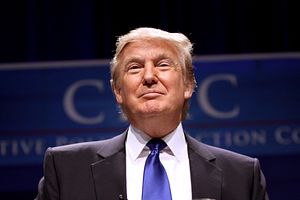Having scored a historic political upset by promising to demolish the status quo, Donald Trump’s looming presidency has raised the prospect of a radical shift in U.S. policy toward North Korean denuclearization.
While outgoing President Barack Obama has shunned talks with North Korea in the absence of concrete steps to disarm, candidate Trump repeatedly suggested he would be willing to talk to dictator Kim Jong-un without preconditions.
“I’ll speak to anybody. Who knows?” Trump said at a campaign event in Atlanta, Georgia in June. “There’s a 10 percent or a 20 percent chance that I can talk him out of those damn nukes because who the hell wants him to have nukes? And there’s a chance — I’m only gonna make a good deal for us.”
Trump’s comments, which followed similar suggestions made during his convention-busting presidential bid, drew a sharp contrast with Obama’s policy of “strategic patience,” and were seized on by Democratic nominee Hilary Clinton as an example of the reality TV star-turned-politician’s naivety and unsuitability for office.
Echoing more conventional wisdom on North Korea, Trump also suggested that China, the isolated country’s major patron, held the key to disarmament at various points during his campaign. Like many of his pronouncements hinting at unorthodox policy, however, Trump has yet to flesh out a detailed plan for denuclearizing North Korea.
So far, Washington’s efforts to pressure Pyongyang to give up its nuclear weapons, including slapping the regime with increasingly tough sanctions, have failed. Despite Obama pledging to work toward a world free of nuclear weapons upon entering office in 2008, he has seen all but one of North Korea’s five nuclear tests happen on his watch. Pyongyang’s most recent detonation, in September, was judged by experts to have been its most powerful yet.
Leon Sigal, a former State Department official who has led informal talks with North Korea on numerous occasions, said Trump’s actual foreign policy remained unclear — but his natural instinct as a negotiator could potentially lead to him to reach out diplomatically.
“If he doesn’t line up the usual suspects in Washington [as advisers], then it might get interesting because the impulse is there,” he said. “After all, he is the president and he doesn’t seem to listen to advice very much.”
Sigal stressed, however, that Trump’s next moves were ultimately impossible to predict, noting that the novice politician was a policy “blank slate.”
“The answer is he is unconventional in the way he does politics,” he said. “We don’t have a clue whether he’s conventional or unconventional in the way he does foreign policy.”

































